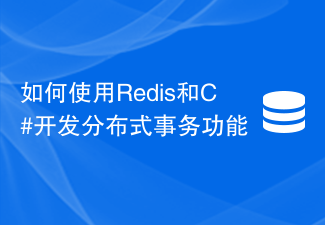 Backend Development
Backend Development C#.Net Tutorial
C#.Net Tutorial Introduction to the method of using DesignSurface to implement a simple form designer in C# (picture and text)
Introduction to the method of using DesignSurface to implement a simple form designer in C# (picture and text)This article mainly introduces C# related information on how to use DesignSurface to implement a simple form designer. The article introduces it in detail through pictures, texts and sample codes. It has certain reference value for everyone. It needs Friends, come and study together.
System.ComponentModel.Design.DesignSurface provides a user interface for the design component, through which a simple form designer can be implemented.
Before building, we need to introduce System.Design.dll, otherwise there will be an error that the DesignSurface cannot be found.

private void Form1_Load(object sender, EventArgs e)
{
//引用System.Deisgn.dll
DesignSurface ds = new DesignSurface();
//开始加载窗体
ds.BeginLoad(typeof(Form));
Control designerContorl = (Control)ds.View;
designerContorl.Dock = DockStyle.Fill;
this.Controls.Add(designerContorl);
}After running, a simple UI designer appears

But the designer cannot implement drag-and-drop of controls and UI designer, as well as property configuration of controls.
In order to support loading the initialization form from the source code, the relevant methods in the source code need to be parsed. Here we use CodeDomDesignerLoader to implement customized services. CodeDomDesignerLoader provides the basis for implementing the designer loader based on CodeDOM. kind.
Inherit Its class needs to override the CodeCompileUnit Parse() method to load the form:
protected override CodeCompileUnit Parse()
{
#region 源文件读取
var sw = new StreamReader(@"E:\FrmUser.cs");
var sw_designer = new StreamReader(@"E:\FrmUser.Designer.cs");
string formCodeCS = sw.ReadToEnd();
string formCodeDesigner = sw_designer.ReadToEnd();
List<string> source = new List<string>();
source.Add(formCodeCS);
source.Add(formCodeDesigner);
#endregion
//Rolsyn解析C#
var rootDesigner = Source2CodeDom.Parse(formCodeDesigner);
codeDesingerCompileUnit = Source2CodeDom.GetDesignerCodeComplieUnit(rootDesigner);
var rootCS = Source2CodeDom.Parse(formCodeCS);
codeCSCompileUnit = Source2CodeDom.GetCodeComplieUnit(rootCS);
//MergeFormSource
string mergeS = Source2CodeDom.MergeFormSource(formCodeDesigner, formCodeCS);
codeMergeCompileUnit = Source2CodeDom.GetMergeDesignerCodeComplieUnit(mergeS);
return codeMergeCompileUnit;The parsing method is as follows, but This parsing is only used for code generation and cannot be used to display the user UI interface: the display of the
public static CodeCompileUnit GetDesignerCodeComplieUnit2(CompilationUnitSyntax root)
{
CodeCompileUnit ccu = new CodeCompileUnit();
var firstMember = root.Members[0];
var namespaceDeclration = (NamespaceDeclarationSyntax)firstMember;
var designClassDeclaration = (ClassDeclarationSyntax)namespaceDeclration.Members[0];
var myDesignerClass = new CodeTypeDeclaration(designClassDeclaration.Identifier.ToString());
var initializeComponent = new CodeMemberMethod();
var ns = new CodeNamespace(namespaceDeclration.Name.ToString());
foreach (var m in designClassDeclaration.Members)
{
if (m is ConstructorDeclarationSyntax)
{
var ctor = ((ConstructorDeclarationSyntax)m);
var codeBody = ctor.Body.ToString();
codeBody = codeBody.Trim().TrimStart('{').TrimEnd('}').Trim().TrimEnd(';');
CodeSnippetExpression csbody = new CodeSnippetExpression(codeBody);
CodeExpressionStatement stmt = new CodeExpressionStatement(csbody);
//Add the expression statements to the method.
// InitializeComponent
var cctor = new CodeConstructor();
cctor.Name = ctor.Identifier.ToString();
//var cmm = new CodeMemberMethod();
//cmm.Name = ctor.Identifier.ToString();
//cmm.Attributes = GetCtoRAttrMapping(ctor);
//cmm.ReturnType = new CodeTypeReference(typeof(void));
cctor.Statements.Add(stmt);
myDesignerClass.Members.Add(cctor);
}
if (m is FieldDeclarationSyntax)
{
var F = ((FieldDeclarationSyntax)m);
var type = F.Declaration.Type;
foreach (var variable in F.Declaration.Variables)
{
var field = new CodeMemberField();
field.Name = variable.Identifier.ToString();
field.Type = new CodeTypeReference(type.ToString());
field.Attributes = GetFieldAttrMapping(F);
//field.InitExpression = new CodePrimitiveExpression(null);
myDesignerClass.Members.Add(field);
}
}
if (m is MethodDeclarationSyntax)
{
var node = m as MethodDeclarationSyntax;
#region xml comments
var xmlTrivia = node.GetLeadingTrivia()
.Select(i => i.GetStructure())
.OfType<DocumentationCommentTriviaSyntax>()
.FirstOrDefault();
#endregion
var method = (MethodDeclarationSyntax)m;
var cmm = new CodeMemberMethod();
cmm.Name = method.Identifier.ToString();
///XML注释
string[] comments = xmlTrivia.ToString().Split("\r\n".ToCharArray());
foreach (string text in comments)
{
if (text.Trim() != "")
{
cmm.Comments.Add(new CodeCommentStatement(text.Trim().TrimStart("///".ToCharArray()).Trim(), true));
}
}
if (cmm.Name == "InitializeComponent")
{
//region
CodeRegionDirective codeRegion = new CodeRegionDirective(CodeRegionMode.Start, "Windows 窗体设计器生成的代码");
CodeRegionDirective codeEndRegion = new CodeRegionDirective(CodeRegionMode.End, "");
cmm.StartDirectives.Add(codeRegion);
cmm.EndDirectives.Add(codeEndRegion);
}
//MemberAttributes.Family is protected
//cmm.Attributes = MemberAttributes.Override | MemberAttributes.Family;
cmm.Attributes = GetMethodAttrMapping(method);
cmm.ReturnType = new CodeTypeReference(method.ReturnType.ToString());
foreach (var p in method.ParameterList.Parameters)
{
CodeParameterDeclarationExpression cpd = new CodeParameterDeclarationExpression();
cpd.Name = p.Identifier.ToString();
cpd.Type = new CodeTypeReference(p.Type.ToString());
cmm.Parameters.Add(cpd);
}
//包含方法{};,会重复生成{};
string codeBody = method.Body.ToString();
codeBody = codeBody.Trim().TrimStart('{').TrimEnd('}').Trim().TrimEnd(';');
if (codeBody != "")
{
CodeSnippetExpression csbody = new CodeSnippetExpression(codeBody);
CodeExpressionStatement stmt = new CodeExpressionStatement(csbody);
//Add the expression statements to the method.
cmm.Statements.Add(stmt);
}
myDesignerClass.Members.Add(cmm);
}
if (m is MemberDeclarationSyntax)
{
}
}
ccu.Namespaces.Add(ns);
//Partial Class
myDesignerClass.IsPartial = true;
ns.Types.Add(myDesignerClass);
return ccu;
} form requires C# parsing sentence by sentence, especially the InitializeComponent() method.


. CS Code is actually the simplest thing to do is to read the source code and then return it. When the designer adds controls or binds events, you can complete the code through text operations.
//直接返回代码,最简单
public string GetTextCSCode()
{
Flush();
return CSTextCode;
}There is OnComponentRename in the CodeDomHostLoader class, which responds when the designer renames the component. Here you can repair the control reference in the background.cs



But there are still many imperfections in this designer. We will improve it later when we have time.
Summarize
The above is the detailed content of Introduction to the method of using DesignSurface to implement a simple form designer in C# (picture and text). For more information, please follow other related articles on the PHP Chinese website!
 如何使用C#编写时间序列预测算法Sep 19, 2023 pm 02:33 PM
如何使用C#编写时间序列预测算法Sep 19, 2023 pm 02:33 PM如何使用C#编写时间序列预测算法时间序列预测是一种通过分析过去的数据来预测未来数据趋势的方法。它在很多领域,如金融、销售和天气预报中有广泛的应用。在本文中,我们将介绍如何使用C#编写时间序列预测算法,并附上具体的代码示例。数据准备在进行时间序列预测之前,首先需要准备好数据。一般来说,时间序列数据应该具有足够的长度,并且是按照时间顺序排列的。你可以从数据库或者
 如何使用Redis和C#开发分布式事务功能Sep 21, 2023 pm 02:55 PM
如何使用Redis和C#开发分布式事务功能Sep 21, 2023 pm 02:55 PM如何使用Redis和C#开发分布式事务功能引言分布式系统的开发中,事务处理是一项非常重要的功能。事务处理能够保证在分布式系统中的一系列操作要么全部成功,要么全部回滚。Redis是一种高性能的键值存储数据库,而C#是一种广泛应用于开发分布式系统的编程语言。本文将介绍如何使用Redis和C#来实现分布式事务功能,并提供具体代码示例。I.Redis事务Redis
 如何实现C#中的人脸识别算法Sep 19, 2023 am 08:57 AM
如何实现C#中的人脸识别算法Sep 19, 2023 am 08:57 AM如何实现C#中的人脸识别算法人脸识别算法是计算机视觉领域中的一个重要研究方向,它可以用于识别和验证人脸,广泛应用于安全监控、人脸支付、人脸解锁等领域。在本文中,我们将介绍如何使用C#来实现人脸识别算法,并提供具体的代码示例。实现人脸识别算法的第一步是获取图像数据。在C#中,我们可以使用EmguCV库(OpenCV的C#封装)来处理图像。首先,我们需要在项目
 Redis在C#开发中的应用:如何实现高效的缓存更新Jul 30, 2023 am 09:46 AM
Redis在C#开发中的应用:如何实现高效的缓存更新Jul 30, 2023 am 09:46 AMRedis在C#开发中的应用:如何实现高效的缓存更新引言:在Web开发中,缓存是提高系统性能的常用手段之一。而Redis作为一款高性能的Key-Value存储系统,能够提供快速的缓存操作,为我们的应用带来了不少便利。本文将介绍如何在C#开发中使用Redis,实现高效的缓存更新。Redis的安装与配置在开始之前,我们需要先安装Redis并进行相应的配置。你可以
 如何使用C#编写动态规划算法Sep 20, 2023 pm 04:03 PM
如何使用C#编写动态规划算法Sep 20, 2023 pm 04:03 PM如何使用C#编写动态规划算法摘要:动态规划是求解最优化问题的一种常用算法,适用于多种场景。本文将介绍如何使用C#编写动态规划算法,并提供具体的代码示例。一、什么是动态规划算法动态规划(DynamicProgramming,简称DP)是一种用来求解具有重叠子问题和最优子结构性质的问题的算法思想。动态规划将问题分解成若干个子问题来求解,通过记录每个子问题的解,
 如何实现C#中的图像压缩算法Sep 19, 2023 pm 02:12 PM
如何实现C#中的图像压缩算法Sep 19, 2023 pm 02:12 PM如何实现C#中的图像压缩算法摘要:图像压缩是图像处理领域中的一个重要研究方向,本文将介绍在C#中实现图像压缩的算法,并给出相应的代码示例。引言:随着数字图像的广泛应用,图像压缩成为了图像处理中的重要环节。压缩能够减小存储空间和传输带宽,并能提高图像处理的效率。在C#语言中,我们可以通过使用各种图像压缩算法来实现对图像的压缩。本文将介绍两种常见的图像压缩算法:
 C#开发中如何处理跨域请求和安全性问题Oct 08, 2023 pm 09:21 PM
C#开发中如何处理跨域请求和安全性问题Oct 08, 2023 pm 09:21 PMC#开发中如何处理跨域请求和安全性问题在现代的网络应用开发中,跨域请求和安全性问题是开发人员经常面临的挑战。为了提供更好的用户体验和功能,应用程序经常需要与其他域或服务器进行交互。然而,浏览器的同源策略导致了这些跨域请求被阻止,因此需要采取一些措施来处理跨域请求。同时,为了保证数据的安全性,开发人员还需要考虑一些安全性问题。本文将探讨C#开发中如何处理跨域请
 如何实现C#中的遗传算法Sep 19, 2023 pm 01:07 PM
如何实现C#中的遗传算法Sep 19, 2023 pm 01:07 PM如何在C#中实现遗传算法引言:遗传算法是一种模拟自然选择和基因遗传机制的优化算法,其主要思想是通过模拟生物进化的过程来搜索最优解。在计算机科学领域,遗传算法被广泛应用于优化问题的解决,例如机器学习、参数优化、组合优化等。本文将介绍如何在C#中实现遗传算法,并提供具体的代码示例。一、遗传算法的基本原理遗传算法通过使用编码表示解空间中的候选解,并利用选择、交叉和


Hot AI Tools

Undresser.AI Undress
AI-powered app for creating realistic nude photos

AI Clothes Remover
Online AI tool for removing clothes from photos.

Undress AI Tool
Undress images for free

Clothoff.io
AI clothes remover

AI Hentai Generator
Generate AI Hentai for free.

Hot Article

Hot Tools

SAP NetWeaver Server Adapter for Eclipse
Integrate Eclipse with SAP NetWeaver application server.

Dreamweaver Mac version
Visual web development tools

ZendStudio 13.5.1 Mac
Powerful PHP integrated development environment

Atom editor mac version download
The most popular open source editor

SublimeText3 Linux new version
SublimeText3 Linux latest version





